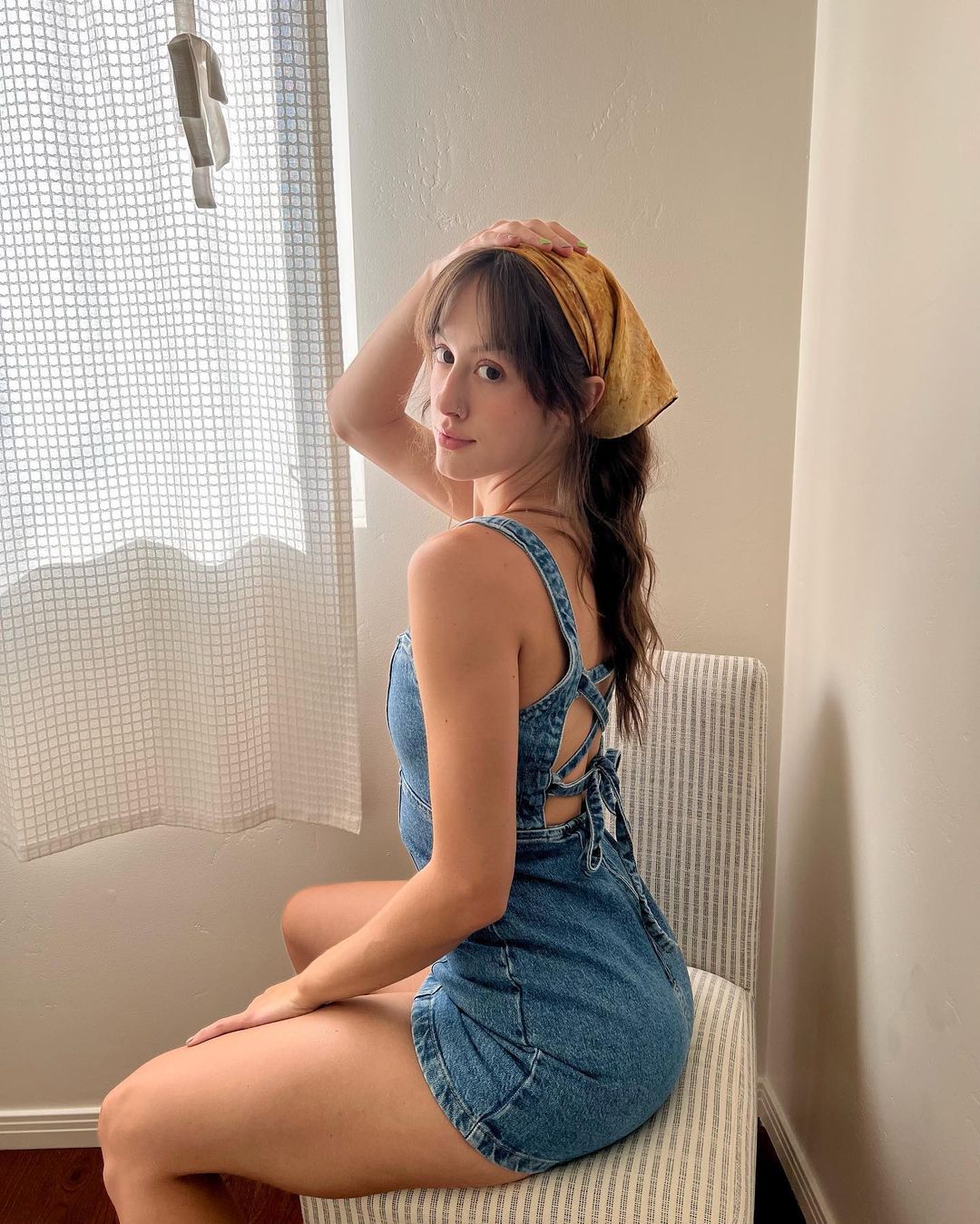Imagine, if you will, looking for something on the internet, something that has caught your eye, perhaps a topic or a name that has sparked your curiosity. You click a link, perhaps with a sense of anticipation, and instead of finding the information you sought, you are met with a message that simply states, "We would like to show you a description here but the site won’t allow us." This very phrase, so, in a way, it acts as a digital barrier, prompting many questions about what lies beyond that invisible wall and why such a message appears.
This experience, that, is quite common in our connected world, where access to information is often filtered or controlled by various entities. It's not just about what we can find, but also about what we are prevented from seeing, and the reasons behind such restrictions. When a website tells you it cannot display certain content, like information related to "julesari nudes," it immediately creates a sense of intrigue, making one wonder about the nature of the content and the rules that govern its display. You know, it's almost like a digital whisper, hinting at something just out of reach.
Such a message, really, makes us think about the vastness of the internet, but also about its limitations. It brings up ideas about privacy, content guidelines, and the choices made by platform owners regarding what gets shared and what remains hidden. This kind of digital gatekeeping shapes our online experience in ways we might not always consider, prompting a closer look at how information, or the lack of it, influences our understanding of a subject, even one as specific as "julesari nudes."
Table of Contents
- Who Exactly is Julesari? Unpacking the Digital Presence
- What Happens When Content Isn't Available?
- Why Do Some Websites Block Information?
- How Does This Shape Our View of Julesari Nudes?
Who Exactly is Julesari? Unpacking the Digital Presence
When a search for a name like "Julesari" brings up a message about content not being allowed, it creates a rather interesting situation. We are given a name, but the typical details one might expect to find are simply not there. This absence of information, you know, makes one wonder about the person or entity behind the name. Is it a public figure whose content is being protected? Is it a private individual whose personal details are intentionally kept from view? Or, perhaps, is "Julesari" more of a concept, a term that has become associated with a certain kind of content that platforms choose not to display?
The digital world, in some respects, often provides a wealth of personal information, from career paths to public appearances. However, when a specific query, especially one that includes terms like "nudes," leads to a content restriction notice, it means that the usual pathways to information are closed off. This lack of access to descriptive material means that, for many, the identity of "Julesari" remains largely undefined, existing more as a point of curiosity than a clearly outlined public persona. It's almost as if the digital landscape has drawn a curtain, preventing us from seeing what lies behind it.
This situation, actually, highlights how much we rely on open access to form our impressions of individuals or topics online. Without that open access, the identity of "Julesari" becomes a subject of speculation rather than direct observation. It's a reminder that not everything on the internet is freely available, and that some information, for various reasons, remains out of reach for general viewing.
Personal Details and Digital Footprint Status
| Name/Identifier | Julesari |
| Known Public Information | Limited to the name itself; specific content related to "nudes" is subject to online restrictions. |
| Digital Presence Status | Content associated with this identifier is frequently flagged for non-display by various platforms. |
| Biographical Details | Not publicly available or verifiable through standard online searches where content is restricted. |
| Reason for Restriction (Implied) | Likely related to platform content guidelines regarding explicit or sensitive material. |
What Happens When Content Isn't Available?
When a website puts up a message saying it cannot show you something, it does more than just block access. It sparks a feeling of curiosity, doesn't it? This immediate barrier makes people wonder why the content is being withheld. It can make the hidden information seem even more interesting or significant, simply because it is not easily seen. The mind, you know, tends to fill in the blanks, often creating its own ideas about what might be there. This can sometimes lead to a heightened desire to find the blocked content, almost like a puzzle that needs solving.
This kind of digital wall, so, also makes us think about the nature of online information. We often assume that if something exists, it should be available for us to look at. However, the "site won't allow us" message reminds us that this isn't always the case. It tells us that there are rules, and people or systems making choices about what gets shown and what doesn't. This experience can be a bit frustrating for someone simply looking for information, as it stops their search right in its tracks, without providing much of a reason.
Moreover, this message affects how we view the platform itself. It signals that the website is actively moderating its content, perhaps to keep things safe, to follow laws, or to maintain a certain kind of environment. While this can be seen as a positive step for user safety, it also means that the platform acts as a kind of gatekeeper, deciding what users are allowed to see. This, in a way, shapes the entire online experience, guiding users towards approved content and away from what is considered off-limits.
The Online Experience and Julesari Nudes
Thinking about "julesari nudes" in this context, the online experience becomes one of searching for something that is, in a manner of speaking, defined by its absence. When someone types those words into a search engine, they are looking for specific material. However, the response they get, the message about content not being allowed, tells them that the usual paths to that material are closed. This means that the search itself becomes a lesson in digital boundaries. It shows that even with a clear intention to find something, the internet does not always provide open access.
This situation, too, can lead to a kind of digital dead end. Users might try different search terms or different platforms, hoping to bypass the restrictions. This effort to find information that is intentionally hidden can become a significant part of the online experience related to "julesari nudes." It changes the search from a simple retrieval of information to an exploration of content moderation and digital access. It's almost like trying to find a book in a library that has been removed from the shelves, but without knowing why it was taken away.
The impact on the user is also worth considering. When content is blocked, it can lead to a feeling of being censored or controlled, even if the reasons for the block are well-intended. For someone interested in "julesari nudes," this could mean feeling like their curiosity is being stifled. It highlights the tension between a user's desire for open information and a platform's need to regulate what is displayed, making the online experience a bit more complex than just finding answers.
Why Do Some Websites Block Information?
Websites choose to block certain types of information for a variety of important reasons. One of the main drivers, you know, is often related to legal obligations. Different countries have different laws about what can and cannot be published online, especially concerning material that might be considered harmful, inappropriate for minors, or that infringes on someone's rights. Platforms, in a way, have to follow these rules to avoid legal trouble, so they put systems in place to prevent the display of such content. This means that if "julesari nudes" falls into a category that is legally restricted in a certain area, the site will act to block it.
Beyond legal requirements, many websites have their own set of community guidelines or terms of service. These rules are put in place to create a certain kind of environment for users, typically aiming for a safe, respectful, and positive space. Content that goes against these guidelines, such as explicit material, hate speech, or harassment, is often automatically or manually blocked. For content like "julesari nudes," it's very likely that it clashes with the platform's internal policies on what is acceptable to show to a general audience. This is a choice made by the platform to shape its user community.
Another reason, too, can be related to the protection of individuals. If the content involves private citizens, or if there are concerns about consent or exploitation, platforms might block it to protect the people involved. This is a significant ethical consideration for many online services. So, if "julesari nudes" refers to images or videos that could be non-consensual or exploitative, then blocking access becomes a measure of protection, prioritizing the well-being of individuals over open access to all content. This decision reflects a commitment to safety and privacy.
Understanding Digital Gatekeepers and Julesari Nudes
The entities that decide what content gets displayed and what gets blocked are often called "digital gatekeepers." These are the companies that own and operate social media sites, search engines, video platforms, and other online services. They have the technical ability and the policy frameworks to control the flow of information. When you search for "julesari nudes" and get a restriction message, it's these gatekeepers who have made the decision not to show it, based on their rules or legal requirements. They act as filters, in a way, for the vast amount of material that exists online.
These gatekeepers, actually, play a very important role in shaping our online experience. They influence what we see, what we talk about, and even what we believe to be true. Their decisions about content, including what to do with searches like "julesari nudes," can have a big impact on public discourse and individual access to information. It means that what is available to us online is not just a reflection of everything that exists, but rather a curated version, filtered through the policies and algorithms of these powerful entities.
The process these gatekeepers use can be quite complex. It often involves a mix of automated systems, which scan for certain keywords or visual patterns, and human moderators, who review flagged content. This combination helps them enforce their rules on a massive scale. For content related to "julesari nudes," it's probable that automated systems first identify the material as potentially problematic, and then human review might confirm that it violates community standards or legal provisions, leading to the restriction message. This ongoing effort is how platforms try to maintain a balance between openness and safety.
How Does This Shape Our View of Julesari Nudes?
The experience of encountering restricted content, particularly when looking for something like "julesari nudes," can significantly shape our perception of the subject. When information is withheld, it doesn't just disappear from our minds; instead, it often becomes more intriguing. This lack of direct access can lead to a sense of mystery around "Julesari," making the topic feel more significant or even controversial than it might otherwise be if the content were freely available. It's almost like a secret, which, in some respects, is always more interesting than something openly displayed.
This situation, too, can influence the way people talk about or think about "julesari nudes." Without concrete information, discussions might become based on rumors, assumptions, or fragmented pieces of data found elsewhere. The narrative around the subject is then built not on direct evidence, but on the implications of its restricted status. This can lead to a distorted view, where the absence of information speaks louder than any potential factual details. It shows how the act of blocking content can inadvertently give it a certain kind of power or mystique.
Moreover, the act of a website saying it "won't allow us" to show something about "julesari nudes" can reinforce the idea that the content is, perhaps, sensitive or even dangerous. This perception, whether accurate or not, comes from the platform's decision to restrict access. It teaches users that this specific topic exists outside the boundaries of what is considered acceptable for general viewing on that particular site. This, in a way, guides public opinion and helps to define what is considered "normal" or "appropriate" in the digital space.
The Broader Picture of Online Content Control and Julesari Nudes
Looking at the bigger picture, the situation with "julesari nudes" and content restrictions is just one small part of a much larger conversation about online content control. Every day, billions of pieces of information are shared, and platforms have to make constant decisions about what stays up, what comes down, and what is simply not allowed to be shown. This ongoing process of moderation affects everything from political discussions to personal blogs, and yes, even searches for specific terms like "julesari nudes." It's a constant balancing act for these companies.
This control, you know, has both benefits and drawbacks. On one hand, it helps to protect people from harmful content, like hate speech, misinformation, or illegal activities. It tries to create a safer environment for everyone who uses the internet. On the other hand, it also raises questions about censorship, freedom of expression, and who gets to decide what is acceptable for public consumption. The case of "julesari nudes" serves as a small example of this broader tension, where the desire for open information meets the need for regulation.
The way content is controlled also changes over time. What was once acceptable might become restricted, and new types of content constantly challenge existing rules. This means that the policies surrounding something like "julesari nudes" are not set in stone; they can evolve as societies change and as new technologies emerge. This dynamic nature of online content control means that the digital landscape is always shifting, and with it, the boundaries of what we can access and what remains hidden from view.
Thinking About Digital Access and Julesari Nudes
When we think about digital access in relation to "julesari nudes," we are really thinking about the gates that exist online. It's not just about having an internet connection; it's about being allowed through those gates to see certain things. The message "We would like to show you a description here but the site won’t allow us" makes these gates very apparent. It highlights that our ability to find information is often contingent on the rules and decisions of the platforms we use. This is a fundamental aspect of how the internet works today.
This concept of restricted access, too, encourages us to be more aware of where we get our information from and how reliable it might be. If a platform is actively blocking certain content, it makes us consider the source and its motivations. For those interested in "julesari nudes," this might mean looking for information on less regulated parts of the internet, which can come with its own set of risks and challenges. It pushes people to consider alternative avenues for information, rather than just relying on mainstream search results.
Ultimately, the experience of encountering a content restriction when looking for "julesari nudes" serves as a reminder of the layered nature of the internet. It's a place of incredible openness, but also one with significant controls and boundaries. It prompts us to think more deeply about how information flows, who controls it, and what that means for our ability to explore and understand the vast digital world around us. This ongoing conversation about access and control will surely continue to shape our online lives.
This article has explored the implications of encountering a "site won't allow us" message when searching for "julesari nudes." We looked at how such a restriction shapes our understanding of the subject, examined the role of digital gatekeepers in controlling online content, and considered the broader picture of digital access and information flow. The discussion touched upon the mystery surrounding "Julesari" due to the lack of accessible information, and how content blocking impacts the online search experience.


